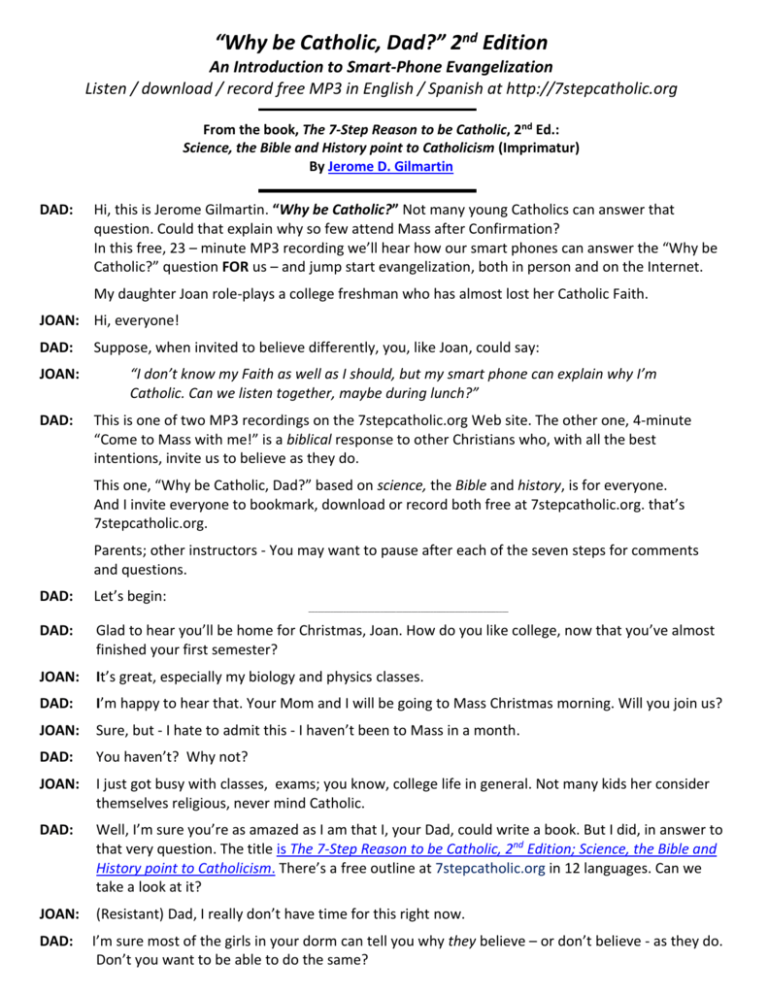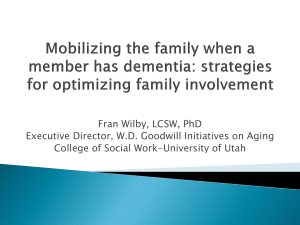
“Why be Catholic, Dad?” 2nd Edition
An Introduction to Smart-Phone Evangelization
Listen / download / record free MP3 in English / Spanish at http://7stepcatholic.org
From the book, The 7-Step Reason to be Catholic, 2nd Ed.:
Science, the Bible and History point to Catholicism (Imprimatur)
By Jerome D. Gilmartin
DAD:
Hi, this is Jerome Gilmartin. “Why be Catholic?” Not many young Catholics can answer that
question. Could that explain why so few attend Mass after Confirmation?
In this free, 23 – minute MP3 recording we’ll hear how our smart phones can answer the “Why be
Catholic?” question FOR us – and jump start evangelization, both in person and on the Internet.
My daughter Joan role-plays a college freshman who has almost lost her Catholic Faith.
JOAN: Hi, everyone!
DAD:
Suppose, when invited to believe differently, you, like Joan, could say:
JOAN:
“I don’t know my Faith as well as I should, but my smart phone can explain why I’m
Catholic. Can we listen together, maybe during lunch?”
DAD:
This is one of two MP3 recordings on the 7stepcatholic.org Web site. The other one, 4-minute
“Come to Mass with me!” is a biblical response to other Christians who, with all the best
intentions, invite us to believe as they do.
This one, “Why be Catholic, Dad?” based on science, the Bible and history, is for everyone.
And I invite everyone to bookmark, download or record both free at 7stepcatholic.org. that’s
7stepcatholic.org.
Parents; other instructors - You may want to pause after each of the seven steps for comments
and questions.
DAD:
Let’s begin:
________________________________________________________________
DAD:
Glad to hear you’ll be home for Christmas, Joan. How do you like college, now that you’ve almost
finished your first semester?
JOAN:
It’s great, especially my biology and physics classes.
DAD:
I’m happy to hear that. Your Mom and I will be going to Mass Christmas morning. Will you join us?
JOAN:
Sure, but - I hate to admit this - I haven’t been to Mass in a month.
DAD:
You haven’t? Why not?
JOAN:
I just got busy with classes, exams; you know, college life in general. Not many kids her consider
themselves religious, never mind Catholic.
DAD:
Well, I’m sure you’re as amazed as I am that I, your Dad, could write a book. But I did, in answer to
that very question. The title is The 7-Step Reason to be Catholic, 2nd Edition; Science, the Bible and
History point to Catholicism. There’s a free outline at 7stepcatholic.org in 12 languages. Can we
take a look at it?
JOAN:
(Resistant) Dad, I really don’t have time for this right now.
DAD:
I’m sure most of the girls in your dorm can tell you why they believe – or don’t believe - as they do.
Don’t you want to be able to do the same?
JOAN:
(With resignation) O.K., Dad, O.K.
DAD:
On your smart phone, just go to the Internet and tap in 7stepcatholic.org. Use the number 7.
JOAN:
(Pause) O.K., Now what?
DAD:
Go to the outline in English. The 7 steps are on the front; footnotes on the back. Would you read
Step 1?
JOAN:
“Strong scientific evidence points to the intelligent design of the universe.” Dad, if I give that as
an answer on my biology exam next month I’ll fail the course!
DAD:
That’s because you’re being taught censored science.
JOAN:
Censored science! How can you say that?
DAD:
Well, it’s not the fault of your professors; they can teach only what the law allows at your secular
university. But read the footnote for Step 1.
JOAN:
It says “Blessed by Padre Pio in 1947, Girl born blind has seen normally since then, THOUGH STILL
WITHOUT PUPILS.
DAD:
Her name is Gemma Di Giorgi. In a recent You Tube video she removes her sunglasses and we see
the clouded eyes of a blind person. But Gemma is not blind; she’s a smiling woman in her 70s who
sees very well. She has, ever since being blessed by Padre, now Saint Pio, when he gave her her
First Holy Communion when she was a child.
If not to God, whom Padre Pio invoked as he blessed little Gemma, to what does science attribute
this phenomenon? And that’s just one of thousands of observable, measurable, life-enhancing
occurrences – miracles – that science makes no serious attempt to explain.
JOAN: Where do I find that video?
DAD:
Just enter, “Blindness cured by Faith.”
DAD:
The book The Language of God was written by Francis S. Collins, Ph.D., former head of the Human
Genome Project. Dr. Collins concludes that the 3 million base-pair human DNA is the language by
which God wrote human beings into existence.
JOAN:
That may not convince the girl in my dorm who’s an atheist. She’s read several books by atheist
Professor Richard Dawkins.
DAD:
I guess she doesn’t know that Professor Dawkins acknowledged the possibility that God exists.
JOAN:
He did?
DAD:
Yes. He said, in effect, that if God exists, he’s going to be big and incomprehensible beyond
anything any religion has ever claimed.
JOAN:
Sounds a lot like the Bible.
DAD:
Actually, it’s from an article by Dan Cray in the November 5, 2006 issue of Time Magazine.
JOAN:
I’ll let her know that.
DAD:
JOAN:
And ask her to check out this Web site: “Resources for Leaving Atheism and Becoming a Christian.”
It was written by former atheists.
O.K., Dad, I see that there’s a strong case for a Creator/God. But on campus we have students
who believe in lots of different gods. Why Christ and Christianity?
2
DAD:
Good question; let’s look at Step 2 of the outline. “In all of history, only Jesus manifested the
power of the Intelligent Designer-Creator, including power over death, and fulfilled the
Messianic prophecies.
JOAN:
Are you saying that no other founder of a religion rose from death?
DAD:
You’ll find resurrection stories on the Internet, especially in mythology. But, other than for Christ,
no religion makes a serious claim of resurrection for its flesh-and blood founder. But check it out.
In your browser enter: Burial – Places – Religion, and bring up the article.
JOAN:
(Pause) Hmmm . . . . I see what you mean. Other than for Jesus, I don’t see any resurrection claim
for any founder of a religion.
DAD:
And doesn’t it make sense to follow Jesus, the one founder who proved, by his Resurrection, that
in the hereafter he can really keep his promises to us?
JOAN:
That sounds like a good reason to follow Jesus, Dad. But those Gospel Resurrection accounts were
written 2,000 years ago. Why should we believe them now?
DAD:
Another good question. Let’s look at Step 3 on the outline. What does it say?
JOAN:
It says, “Evidence for the very early origin and authenticity of the Gospels includes writings of
the Early Church Fathers and others . . . .”
DAD:
Those who doubt the Resurrection are confronted with the Letter of Bishop Polycarp to the
Philippians. In it he affirms the Resurrection of Christ five times. Why is Polycarp so credible?
Because he was a disciple of John the Apostle. John saw Jesus die on the cross. He was there when
the risen Jesus asked Thomas to put his hand into the wound in his side. He heard Thomas say,
“My Lord and my God!”
Years later, the elderly Bishop Polycarp died as a martyr. It seems that the Roman Procurator did
not want to kill the frail, elderly Bishop standing in front of him. He said, “Take the oath and I will
release you; revile Christ.” Polycarp replied, “Eighty-six years I have served Him, and He has never
done me wrong. How then should I be able to blaspheme my King who has saved me?”
Do you think the Apostle John’s eyewitness account of the death and Resurrection of Jesus gave
Polycarp the courage to die as did – stabbed to death – rather than revile Christ?
JOAN:
Yes, Dad, I do.
DAD:
Now, in your browser, enter “Irenaeus, Bishop of Lyon.” That’s I-R-E-N-A-E-U-S, Bishop of
L-Y-O-N. Irenaeus was a disciple of Polycarp. Here’s what Irenaeus wrote about the Gospels:
“Matthew issued a written Gospel among the Hebrews in their own dialect, while Peter and
Paul were preaching at Rome and laying the foundations of the church. After their departure,
Mark, the disciple and interpreter of Peter, did also hand down to us in writing what had
been preached by Peter. Luke also, the companion of Paul, recorded in a book the Gospel
preached by him. Afterwards, John, the disciple of the Lord, who also had leaned upon His
breast, did himself publish a Gospel during his residence at Ephesus in Asia.”1
Who, then, Joan, should we believe; those who doubt the authenticity of those Gospels, or the
disciple of Bishop Polycarp, Bishop Irenaeus, who affirms them so clearly?
JOAN:
1
I had no idea that the Gospels – including Christ’s Resurrection – were backed by this kind of early
testimony. I see that it makes sense to be a Christian. But Dad, there are lots of different Christian
denominations, Why should I be Catholic?
Irenaeus; Against Heresies; Book III, 1, 1 Christian Classics Ethereal Library. http://www.ccel.org/ccel/schaff/anf01.ix.iv.ii.html
3
DAD:
Well, don’t all Christians base their belief on the Bible?
JOAN:
DAD:
Yes, I think they do.
Well, the Bible is foundational for Catholics too. So let’s move to Step 4 of the outline. Would you
read it?
JOAN:
“Jesus founded one Church, said there would be one flock, one Shepherd and prayed for the
unity of all believers.”
DAD:
Now read the footnote.
JOAN:
Well, after giving biblical chapter and verse for what I just read, it says, “Today more than 33,000
Christian denominations do not agree on requirements for salvation.”
So if Jesus said there would be one flock, with one Shepherd, in one united Church, how can we
find that one Church among so many?
DAD:
Well, if all Christians, including Catholics, are “Bible Christians,” shouldn’t we all look to the Bible
to see to whom the risen Jesus gave authority in the one Church he was founding?
JOAN:
That sounds like what I see in Step 5: “Having instituted the Eucharist and given primacy in his
Church to Peter, the risen Jesus commissioned the APOSTLES to make disciples of all nations.”
DAD:
And the footnote includes the last three verses of Matthew, the Great Commission, where the
risen Jesus says:
"All authority in heaven and on earth has been given to me. Go therefore and make disciples
of all nations, baptizing them in the name of the Father and of the Son and of the Holy Spirit,
and teach them all I have commanded you; and lo, I am with you always, to the close of the
age." [Mt 28:18-20; RSV-CE]2
JOAN: My Christian friends say Jesus gave that commission to everyone. Why do you say he gave it only
to the Apostles?
DAD:
Just two verses earlier, we read that the risen Jesus called the 11 to that mountain. The 12th, Judas
Iscariot, had killed himself.
JOAN:
O.K., I see that Jesus gave his authority in his one Church to those apostles. But, why should we
believe that that Church exists today, two thousand years later?
DAD:
That brings us to Step 6. Would you read it?
JOAN:
“The Pope and Catholic bishops today are the spiritual and historical successors of Peter and the
other apostles.” But how can we be sure of that?
DAD:
Jesus said he would be with the apostles “always.” He also said he would return in glory to judge
the living and the dead. These two biblical statements of Jesus made clear that he would grant his
authority to the successors those apostles would ordain, and they in turn would ordain, until his
triumphant return.
Soon the apostles chose Matthias to replace Judas Iscariot. Before long Paul was welcomed as
apostle to the Gentiles. The apostles and their successor bishops continued to ordain successors
in turn through the centuries. When a Pope died, they elected a successor. In 2013, the successor
Cardinal / Bishops, elected Jorge Mario Bergolio – the Archbishop of Buenos Aires, Argentina –
Pope Francis, the 265th successor of Peter.
2
“The Catholic Edition of the Revised Standard Version of the Bible, copyright 1965, 1966 by the Division of Christian Education of the National Council of the Churches
of Christ in the United States of America. Used by permission. All rights reserved.
4
JOAN:
It sounds like a strong case for Catholicism, Dad; but some of my friends say the original apostolic
Church went off the rails. After that Christianity had to be preached by others.
DAD:
That brings us to Step 7, the last one of the outline. Would you read it?
JOAN:
“Although denied by Peter, betrayed by Judas Iscariot, abandoned by all apostles but John and
scandalized by some of the ordained and consecrated, including a few popes of history, Jesus
gave us no biblical ‘escape clause’ to reject the one Church he founded and, through the
apostles, promised to be with always.”
DAD:
In the Bible we read that Jesus foresaw many things. As God he certainly foresaw the actions of
every future Pope, bishop, priest, deacon and religious. If any or all of their actions would cause
Jesus to abandon the one Church he founded, would he have promised to be with that one
apostolic Church ALWAYS?
JOAN:
No, when God gives his word like that I’m sure he keeps it.
DAD:
Yes, surely he keeps it.
JOAN:
But Dad, I have good, clean-living Christian friends who say the Catholic Church is wrong on many
of its interpretations of the Bible; for example, that the Eucharist really is the Body and blood of
Christ and that Purgatory exists. What can I say to them?
DAD:
Well, I’d say, “Shouldn’t we set aside our own opinions and look to the Bible to see whose
interpretation we should accept? Doesn’t that take us back to Jesus’ Commission only of the
Apostles, and the interpretations of his one apostolic Church that we find in the Catechism of the
Catholic Church today?
JOAN:
But Dad, didn’t Jesus say that when two or three gathered in his name he would be with them?
DAD:
Yes. Jesus was with many groups gathered in his name; for example, The Sermon on the Mount.
And surely he is with such groups today. But, other than his Commission of the 11, to which of
those groups did he say Go; make disciples of all nations; teach them all I have commanded you?
The answer is none.
As much as we may respect and admire the fervor of our fellow Christians and those who lead
their faith traditions, who among them can make a stronger biblical claim for their own authority
to form a religion and interpret the Bible? The answer is none.
Now Joan, do you see why I say that Science, the Bible and History point to the Catholic Faith?
JOAN: Yes, Dad, I do. But I have one last question; maybe the hardest of all to answer: If we really have a
loving God, why does He allow bad things to happen to good people?
DAD:
Yes. How can an all-powerful God, who created us and loves us, not protect us from severe birth
defects, murder, genocide, natural disasters and more?
Suppose, before the dawn of time, Satan and God had the following conversation:
SATAN: [Says to God] You’ve made a huge mistake.
GOD:
Oh, and what is that?”
SATAN: In the Settings mode of your template for mankind you forgot to turn Free Will to the off
position. Unless you reset human free will to off, I’ll be able to entice great numbers of
them to do my will; not yours; and spend eternity in my kingdom, not yours. Adam and
Eve, will give in to my temptation. You’ll evict them from that wondrous Garden of Eden,
5
curse the ground and, it seems, degrade every aspect of future human life, right down to
their DNA.
GOD:
Yes, Satan. Even those in a position to crucify my Son will do your bidding; not mine.
SATAN: I am astounded! WHY would you give free will to humans knowing that it will result in the
death of your own Son?
GOD:
You know that I am a God of Justice, Satan; that is why I cast you out of Heaven; but I am,
above all, a God of Love. Without free will, like programmed computers, mankind would
be unable to love and unable to understand the infinite value of MY love. But one day you
will hear my Son Jesus say, “I give you a new commandment; love one another as I have
loved you.” Those who do so will experience MY LOVE for all eternity - and I theirs.
DAD:
In this life, Joan, we will never fully understand why bad things happen to good people. But we
know that Jesus Christ, Divine Son of the Father, suffered, died on the cross, and rose from death
on the third day so that we might enjoy God’s unfathomable love in Heaven for all eternity.
Knowing that, should we allow our own sufferings to cause us to deny the existence of God?
Joan:
No; Dad. The death of Jesus on the Cross makes human suffering easier for me to accept, if not to
understand. In fact, it makes my faith stronger.
DAD:
Yes. And now, if a well-meaning Christian, non-Christian or atheist invites you to give up your
Catholic faith and believe as they do, what will you do?
JOAN:
I’ll invite them to listen to this recording with me on my smart phone, or my tablet.
DAD:
Thanks, Joan, for role-playing that college student; the objections you raised will resonate with
many, no matter what they believe or don’t believe. And, at 7stepcatholic.org, there are links to
many solid Catholic web sites, including the on-line Catechism of the Catholic Church, 2nd Ed., the
official summary of Catholic teaching.
JOAN:
You’re welcome, Dad.
DAD:
Let me close with this thought. The risen Jesus said to Peter, “Do you love me?” and Peter
answered “Yes, Lord you know I love you.” The question Jesus would ask each of us today might
be this, “Do you love me enough to do so in the one apostolic Church I founded and promised to
be with always?”
On behalf of Joan and me, this is Jerome Gilmartin saying, thanks for listening. God bless!
____________________________________
Jerome D. Gilmartin
http://7stepcatholic.org
jdgilmartin@hotmail.com
570 650-1327
6







